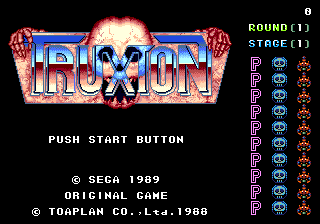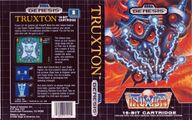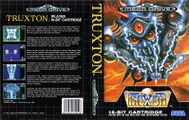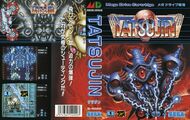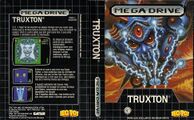Truxton
From Sega Retro
| Truxton | |||||||||||||||||||||||||||||||||||
|---|---|---|---|---|---|---|---|---|---|---|---|---|---|---|---|---|---|---|---|---|---|---|---|---|---|---|---|---|---|---|---|---|---|---|---|
| System(s): Sega Mega Drive | |||||||||||||||||||||||||||||||||||
| Publisher: Sega | |||||||||||||||||||||||||||||||||||
| Developer: Toaplan | |||||||||||||||||||||||||||||||||||
| Original system(s): Arcade boards | |||||||||||||||||||||||||||||||||||
| Genre: Shoot-'em-Up | |||||||||||||||||||||||||||||||||||
| Number of players: 1 | |||||||||||||||||||||||||||||||||||
|
This short article is in need of work. You can help Sega Retro by adding to it.
Truxton, released in Japan as Tatsujin (達人, translates to "Master" as in "mastery"), is a 1988 arcade shoot-'em-up developed by Toaplan, ported to the Mega Drive in 1989. It remains to be the closest home release until today.
Contents
Story
The Gidans have begun an invasion of the Borogo and have managed to destroy all but one Borogo fighter ship; the player must take control of this ship (the "Super Fighter") and defeat the Gidans.
Gameplay
![]() shoots,
shoots, ![]() shoots rapidfire, and
shoots rapidfire, and ![]() launches a bomb (which resembles a full screen size skull when exploding; you have a limited supply of these).
launches a bomb (which resembles a full screen size skull when exploding; you have a limited supply of these).
Items
Powerups are mostly found in predetermined areas, though some may be scattered. There are a number of types of powerups:
| Power Shot | |
|---|---|
| The default weapon of the Super Fighter. It is a standard bullet shot, upgradable to create spread shots. The final upgrade is a new circular shot weapon not present in the arcade version. | |
| Tatsujin Beam/Truxton Beam | |
| The strongest weapon in the game, capable of cutting straight through enemies. The downside is that it can only fire forwards. | |
| Thunder Laser | |
| A continuous beam of energy that locks on to enemy targets. Upgrading adds more beams and increases the strength. | |
| Power Booster | |
| These powerups add a "P" to the HUD on the right side of the screen. After a certain number of Ps are collected (initially 5), your weapons power up one level. This powering up will last until you lose a life, but will carry over from weapon to weapon until then. There are three "levels" of upgrades. | |
| Speed Booster | |
| Increases the speed of your ship. There are five levels of speed - collecting these items after your ship is maxed out will grant the player 5000 points. | |
| Tatsujin Bomb/Destroyer Bomb | |
| Adds a bomb to your arsenal. Bombs destroy all small enemies on screen and evaporate enemy bullets. They can also significantly damage bosses. Unlike in the arcade release, this one covers the whole screen. |
Stages
Though the American (and others?) manual suggests each asteroid graphic (there are eight) is a separate level, Truxton is correctly divided into five stages; each has its own musical theme and stage boss (which have their own musical theme).
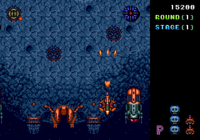
|
Stage 1 |
|---|---|
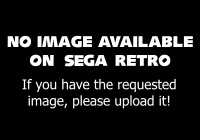
|
Stage 2 |

|
Stage 3 |

|
Stage 4 |

|
Stage 5 |
Tips and tricks
- There is a damage related bug in the game: pausing while the skull bomb effect is on screen makes it cause more damage.
Versions
This port is unusual in that it appears to be written for PAL specs; the overall speed of the game, music and sound effects, etc, greatly resemble the arcade version when played at 50 FPS.
Despite the small ROM size and plenty of screen filling enemies, almost all graphics in this game are stored in an uncompressed state.
Localised names
| Language | Localised Name | English Translation |
|---|---|---|
| English (US) | Truxton | Truxton |
| Japanese | 達人 | Tatsujin |
Production credits
- Staff: T. Ohta, M. Yuge, K. Iwabuchi, S. Nakaoka, N. Sawada, Y. Tataka
- Cast: Tatsuo, Lilin, Jtank, Badron, Gulus, Dosvam, Dogurava
Magazine articles
- Main article: Truxton/Magazine articles.
Promotional material
also published in:
- Computer & Video Games (UK) #107: "October 1990" (1990-09-16)[6]
Physical scans
| 76 | |
|---|---|
| Based on 36 reviews | |
| Mega Drive, AU |
|---|
|
| Mega Drive, SE (rental) |
|---|
|
References
- ↑ File:VComputerEntertainer_US_Vol.8_10.pdf, page 23
- ↑ GamePro, "April 1990" (US; 1990-xx-xx), page 52
- ↑ Mean Machines, "October 1990" (UK; 1990-09-xx), page 93
- ↑ 4.0 4.1 4.2 Raze, "January 1991" (UK; 1990-11-29), page 57
- ↑ ACE, "October 1990" (UK; 1990-09-xx), page 51
- ↑ Computer & Video Games, "October 1990" (UK; 1990-09-16), page 122
- ↑ Beep! MegaDrive, "February 1990" (JP; 1990-01-08), page 67 (69)
- ↑ 8.0 8.1 Sega Saturn Magazine, "September 1995" (JP; 1995-08-08), page 87
- ↑ File:ComputerEntertainer_US_Vol.8_10.pdf, page 18
- ↑ 10.0 10.1 Complete Guide to Consoles, "Volume IV" (UK; 1990-11-xx), page 39
- ↑ 11.0 11.1 Computer & Video Games, "March 1990" (UK; 1990-02-16), page 97
- ↑ Hobby Consolas, "Octubre 1991" (ES; 1991-xx-xx), page 85 (77)
- ↑ 13.0 13.1 Joystick, "Octobre 1990" (FR; 1990-xx-xx), page 91
- ↑ 14.0 14.1 MegaTech, "Xmas 1991" (UK; 1991-12-06), page 81
- ↑ Mean Machines, "October 1990" (UK; 1990-09-xx), page 92/93 (92)
- ↑ 16.0 16.1 Sega Power, "October 1991" (UK; 1991-09-05), page 55
- ↑ 17.0 17.1 Sega Pro, "April 1992" (UK; 1992-03-19), page 30
- ↑ 18.0 18.1 Zero, "May 1990" (UK; 1990-0x-xx), page 87
- ↑ 1700 igr dlya Sega, "" (RU; 2001-xx-xx), page 304
- ↑ 1700 igr dlya Sega, "" (RU; 2001-xx-xx), page 251
- ↑ Aktueller Software Markt, "Februar 1990" (DE; 1990-xx-xx), page 92
- ↑ Beep! MegaDrive, "February 1990" (JP; 1990-01-08), page 69
- ↑ Computer Entertainer, "January 1990" (US; 1990-01-20), page 18
- ↑ Complete Guide to Consoles, "Volume Two" (UK; 1990-04-xx), page 23
- ↑ The Complete Guide to Sega, "" (UK; 1991-05-xx), page 51
- ↑ Console XS, "June/July 1992" (UK; 1992-04-23), page 135
- ↑ Electronic Gaming Monthly, "March 1990" (US; 1990-xx-xx), page 20
- ↑ Mean Machines: The Essential Sega Guide, "" (UK; 1993-11-18), page 110
- ↑ Famitsu, "1990-01-05,19" (JP; 19xx-xx-xx), page 17
- ↑ Hobby Consolas, "Octubre 1991" (ES; 1991-xx-xx), page 85
- ↑ Sega Mega Drive Advanced Gaming, "January 1993" (UK; 199x-xx-xx), page 95
- ↑ Mega Drive Fan, "August 1990" (JP; 1990-07-07), page 73
- ↑ Mega Action, "June 1993" (UK; 1993-05-20), page 65
- ↑ Micromanía (segunda época), "Noviembre 1990" (ES; 1990-1x-xx), page 60
- ↑ Mean Machines, "October 1990" (UK; 1990-09-xx), page 92
- ↑ Mean Machines Sega, "October 1992" (UK; 1992-09-xx), page 142
- ↑ Megazone, "June/July 1991" (AU; 1991-0x-xx), page 24
- ↑ Power Play, "3/90" (DE; 1990-02-19), page 104
- ↑ S: The Sega Magazine, "November 1990" (UK; 1990-10-04), page 8
- ↑ 40.0 40.1 Sega Pro, "April 1993" (UK; 1993-03-11), page 68
- ↑ Tilt, "Septembre 1990" (FR; 1990-0x-xx), page 88
- ↑ Top Secret, "Marzec 1995" (PL; 1995-xx-xx), page 57
- ↑ Tricks 16 bit, "Tricks Sega Gold 800 igr" (RU; 1998-03-20), page 206
- ↑ VideoGames & Computer Entertainment, "February 1990" (US; 1990-0x-xx), page 87
NEC Retro has more information related to Tatsujin
|
- 1 player games
- JP Mega Drive games
- All JP games
- US Mega Drive games
- All US games
- EU Mega Drive games
- All EU games
- AU Mega Drive games
- All AU games
- BR Mega Drive games
- All BR games
- KR Mega Drive games
- All KR games
- Mega Drive games
- 1989 Mega Drive games
- All 1989 games
- Mega Drive shoot-'em-up games
- All shoot-'em-up games
- Use romtable template
- All games
- Stubs
- Pages with broken file links
- Bad translation
- Credits without source
- Credits without reference
- GalleryPrintAd file defined
- Old-style rating (bemega)
- Old-style rating (bemega r)
- Old-style rating (ce)
- Use magref
- Old-style rating (cgtc)
- Rating without PDF source
- Old-style rating (cvg)
- Old-style rating (hobbyconsolas)
- Old-style rating (joystick)
- Old-style rating (mdag)
- Old-style rating (megaaction)
- Old-style rating (megatech)
- Old-style rating (mm)
- Old-style rating (raze)
- Old-style rating (s)
- Old-style rating (segapower)
- Old-style rating (segapro)
- Old-style rating (zero)
- Update ratings template
- 19 old ratings
